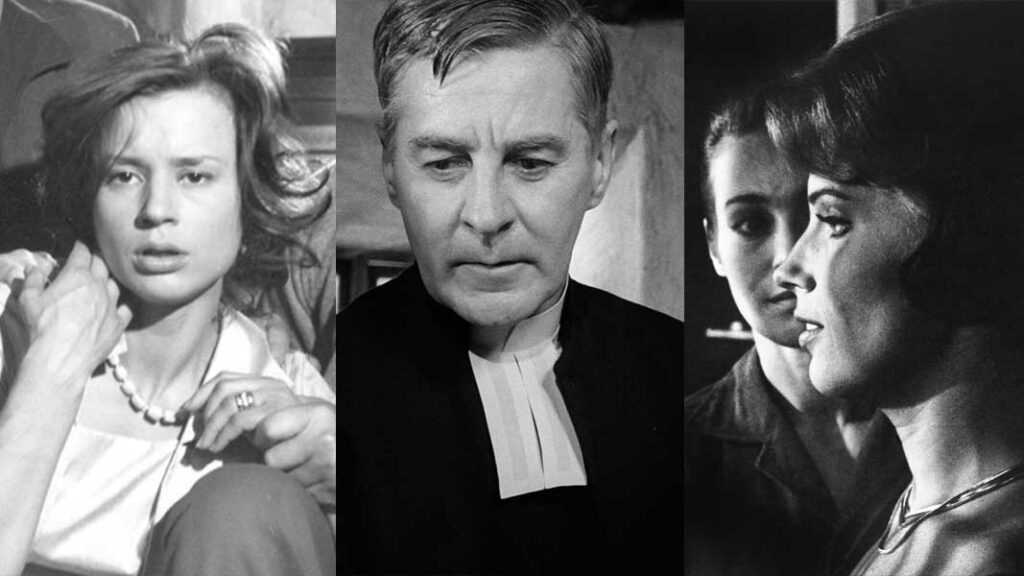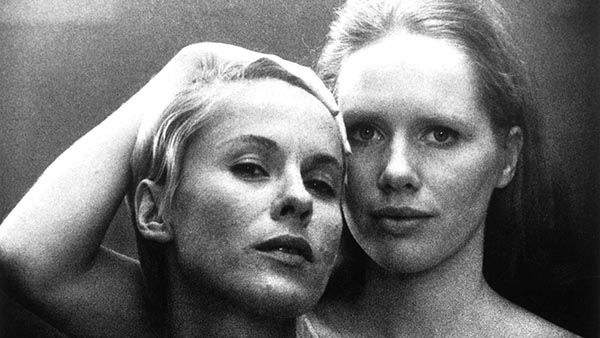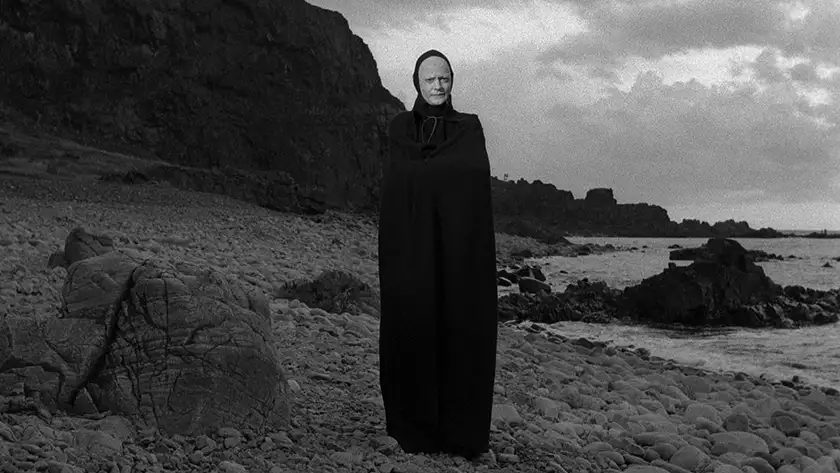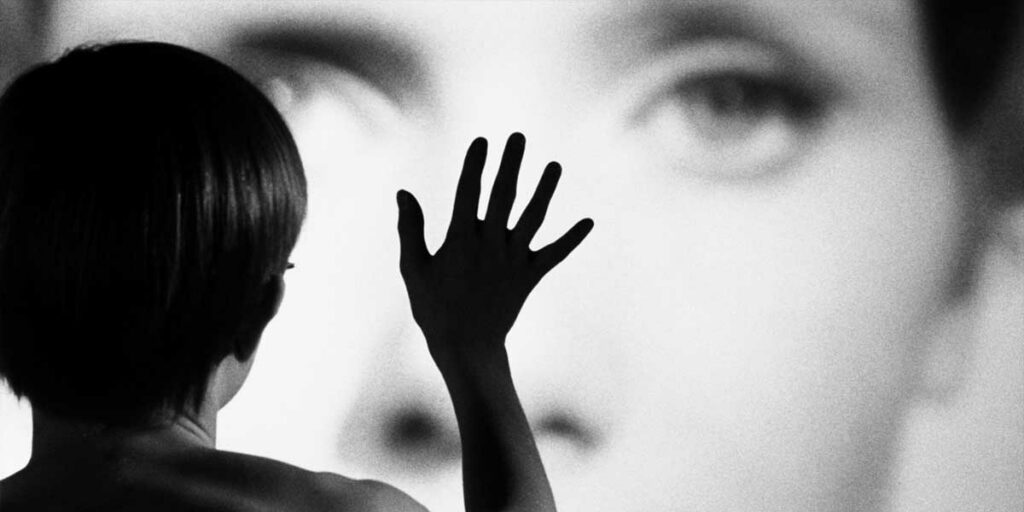Great world cinema director Ingmar Bergman wrestled with his religion and beliefs, represented in his extensive and revolutionary filmography.
Any film fan who experiences an Ingmar Bergman film know instantly that he was one of the most thought-provoking filmmakers to emerge from world cinema. The Swedish auteur made around 60 films in his lifetime and looking into those works – especially those made in the 1960s – will reveal the director’s personal struggle with religion and the idea of God. His films often grapple with the notion of God, and how a good God can exist in a confused and cruel world.
Ingmar Bergman’s Silence Trilogy

The most obvious place to start exploring Bergman’s religious themes is in a quasi-trilogy of films he made in the early 1960s. The trilogy, consisting of Through a Glass Darkly (1961), Winter Light (1963), and The Silence (1963), include several explicitly spiritual ideas. Depending on who you ask, the trilogy is referred to as either the Trilogy of Faith, or the Silence of God Trilogy. The fact that the trilogy can be known by two seemingly contradictory titles makes sense, considering the extensive religious evaluation Bergman seemed to be going through while making the films. He seems to bounce back and forth between atheism and some form of deism.
The first film in the trilogy, Through a Glass Darkly, gets its title from a passage in the New Testament book of I Corinthians. Chapter 13, verse 12 states: “For now we see through a glass, darkly; but then face to face: now I know in part; but then shall I know even as also I am known.” This verse is written by the apostle Paul, and he is describing how humankind’s knowledge and understanding of God is limited. He describes it as looking through a dim mirror, or “through a glass darkly.” This idea fits Bergman’s first film, and the whole trilogy, quite well. In Darkly, four family members take a trip to an island and experience dysfunction. The film culminates with a harrowing scene in which Karrin (Harriet Andersson) believes that God himself came to her in the form of a spider she saw emerge from a crack in the bedroom wall. Karrin, who has been treated for schizophrenia, announces that she has “seen God” before leaving in a helicopter taking her to a hospital.
The spider can be seen as a symbol for humanity’s inability to know or understand God, and therefore fear Him. In the closing minutes of Through a Glass Darkly, Gunnar Björnstrand’s David offers his remedy to seeing through the darkness of the world: love. He believes God and love are synonymous giving a grim film a hopeful ending: “Karrin is surrounded by God since we love her.”
Film historians state Bergman came to grips with his loss of faith while making the second film in the trilogy, Winter Light. This is an interesting conclusion, given that the fate of Pastor Tomas’ (Gunnar Björnstrand) faith remains ambiguous at the film’s end. Over the course of the short 81-minute runtime, Tomas grapples with some of the deepest and most difficult theological questions (in terms of plot and theme, the film is similar to Robert Bresson’s Diary of a Country Priest. Paul Schrader’s First Reformed draws heavily from both films).
Tomas tries to help a member of his low-attendance church, Jonas Parssons, when Parssons expresses despair at the news of an atomic bomb being developed in China. This attempt, as well as other personal strife, sends Tomas spiraling into his own fits of doubt and despair about the chaos in the world and the seemingly uncaring God who would allow these things to happen. Tomas is at his lowest towards the film’s end when Algot, a church worker, asks Tomas about the crucifixion of Jesus. He asks whether God’s silence when Jesus says, “My God, my God, why have you forsaken me?” was worse than the actual pain and suffering on the cross. The final scene shows Tomas preaching again to his minute congregation, though it remains unclear whether he truly believes it when he says “Holy, holy, holy is the Lord of hosts.” The ambiguous ending mirrors Bergman’s own back-and-forth between his own religious views.
The third film in this trilogy, The Silence, might feel slightly out of place, since it does not evoke religious imagery or ideas in as obvious a way as Through a Glass Darkly or Winter Light, though Bergman stated that the film’s title is referring to God’s silence. The film follows sisters Ester (Ingrid Thulin) and Anna (Gunnel Lindblom) and Anna’s son, Johan (Jörgen Lindström) as they reside in a hotel in a European country ravaged by war. Johan represents the “faith of a child” concept found in the New Testament. He wanders through the hotel and is generally in awe of the world around him. Ester and Anna, meanwhile, are jaded. One is physically ill, while the other gives herself over to her vices. Bergman illustrates that feeling uncertain of the world around us comes with age, as Johan goes through a loss of innocence by witnessing the conflict between the sisters and the tanks rolling down the empty streets. Pairing the characters and the film’s title, it is safe to assume that Bergman thinks that God remains silent as this personal and universal destruction unfolds.
Religion in Persona

Bergman’s Persona consistently tops many greatest art films of all time lists, and for good reason. Critics and film buffs have interpreted the film in a variety of ways, and while it may not be as clearly religious as other Bergman films, Persona certainly gives some insight into his worldview, especially following the trilogy (Persona shares many similarities with The Silence, especially). In the film, two women, one who has mysteriously gone mute and the other a nurse, are secluded on an island. The two’s personalities begin to eerily blend as secrets begin to be revealed about each. The movie unfolds like a dream, causing the audience to wonder what is real and what is simply in the imagination of the characters.
I have long held the view that Persona is a representation of the life of an artist. Elisabet and Alma both act as art/artist throughout the film, each taking turns as the one seemingly in control of the other. Additionally, multiple scenes contain one of the women divulging unsettling secrets to the other. A terrific early scene also shows Elisabet watching a television in horror as scenes of war, self-immolating, and other terrors flash across the screen. The film demonstrates how an artist uses the outlet of their art to deal with both their personal struggles and the evils of humanity writ large. If Bergman believes that God is either non-existent or silent, his antidote to the chaos of the world is both love (as seen in Through a Glass Darkly) and art.
Religious Clues in Other Bergman Films

The Seventh Seal, which remains one of Bergman’s most popular works, wrestles with the concept of death and contains some deeply Christian imagery, as well. The Passion of Anna, Wild Strawberries, and other films give other hints and clues for Bergman’s ever-changing philosophy. Many of his films depict suffering, despair, and torment. Whether his movies demonstrate a disbelief in God or a belief in a seemingly silent God will continue to be debated. Ultimately, though, Bergman’s worldview and thesis boils down to a line in Persona, when Alma whispers to the bed ridden Elisabet: “I think art is enormously important in life…especially for those struggling.”

